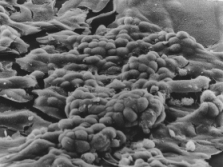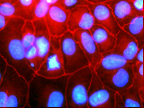Home Recent Publications Teaching Lab Members
What are
tumor suppressor genes? 
Genes that cause cancer can be roughly
grouped into 2 categories: oncogenes and tumor
suppressors. Oncogenes are
normal
cellular genes which cause cancer only when they become
overactive (through mutation, over-expression,
amplification, etc.). On the contrary, tumor
suppressor genes are genes that normally block cancer. Cancer
occurs when these tumor suppressors are inactivated
(usually through mutation or silencing).
Many of the known tumor
suppressor genes have been discovered by studying
families in which a large number of members have a
particular cancer (familial cancer syndromes). Often, these families have a
mutation in a tumor suppressor gene which is passed down
through the generations.
Genetics of
tumor suppressors.
For most tumor suppressor genes, both copies (alleles)
need to be inactivated before tumors are formed. Individuals that develop these
familial cancers usually inherit only one mutant copy
(from either parent) of the tumor suppressor gene. The other normal (wild-type)
allele is often lost in a single cell, leaving it with
no functional copies of the tumor suppressor. This initiates the
carcinogenic process in this cell.
Mutations in other genes must occur for the cell
to become fully malignant and develop into a tumor.
 llular approach to
cancer
llular approach to
cancer Most tumors are clonal outgrowths of a single malignant cell. In my lab, we study the earliest events in cancer that cause these single cells to lose their normal growth control. The approach taken consists of a blend of cell biology, genetics, and molecular biology. Some of the student projects involve creating and expressing mutant VHL proteins and determining their effects in cells. We are also utilizing RNA interference to block the expression of specific genes and then analyzing the cellular effects. Specific techniques that are learned and utilized in my lab include Western blotting, immunoprecipitation, microscopy (including immunofluorescence), molecular cloning (PCR, restriction digests, etc.), and cell culture (transfection and retroviral infection, selection, growth assays, DNA damage assays, and more).
My students
Currently, my lab has a number of undergraduate and graduate (Master’s level) students who carry out the bulk of the research (with a little help from me) either on a volunteer basis or for course credit. My lab is open to Adelphi students in the biology program, following my approval. (If you are not currently an Adelphi undergraduate biology major or in our graduate (M.S.) biology program and want to find out more about these programs, please click on the links). Because space is limited, I am looking for students who are sincerely interested in performing research and are willing to commit the time and energy necessary to succeed.